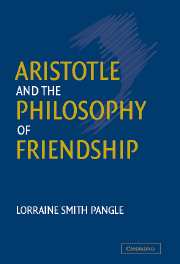Book contents
- Frontmatter
- Contents
- Acknowledgments
- Introduction
- 1 The Challenge of Plato's Lysis
- 2 The Three Kinds of Friendship
- 3 Aristotle and Montaigne on Friendship as the Greatest Good
- 4 Friendships in Politics and the Family
- 5 Cicero's Laelius: Political Friendship at Its Best
- 6 Quarrels, Conflicting Claims, and Dissolutions
- 7 Friends as Other Selves
- 8 Goodwill, Concord, and the Love of Benefactors
- 9 Self-Love and Noble Sacrifice
- 10 Friendship in the Happy Life
- Notes
- Bibliography of Modern Works and Editions
- Index of Names
2 - The Three Kinds of Friendship
Published online by Cambridge University Press: 04 July 2009
- Frontmatter
- Contents
- Acknowledgments
- Introduction
- 1 The Challenge of Plato's Lysis
- 2 The Three Kinds of Friendship
- 3 Aristotle and Montaigne on Friendship as the Greatest Good
- 4 Friendships in Politics and the Family
- 5 Cicero's Laelius: Political Friendship at Its Best
- 6 Quarrels, Conflicting Claims, and Dissolutions
- 7 Friends as Other Selves
- 8 Goodwill, Concord, and the Love of Benefactors
- 9 Self-Love and Noble Sacrifice
- 10 Friendship in the Happy Life
- Notes
- Bibliography of Modern Works and Editions
- Index of Names
Summary
When we return to Aristotle's discussion of friendship in Book 8 of the Nicomachean Ethics after examining the Lysis, we are able to see the ways in which Aristotle engages and responds to the arguments of the Lysis, at once silently conceding some of Socrates' central contentions and, at the same time, offering in Chapters 2 to 6 a sustained counterargument to Socrates' thesis about friendship and the good. Most prominent among Aristotle's tacit concessions is the fact that he nowhere attempts to argue that in friendship one can ever simply leave behind the concern with one's own good. To the contrary, Aristotle identifies the three sources of affection or types of objects that are loved or lovable (φιλητόν) as the good, the pleasant, and the useful, adding that the useful is loved only as a means to the good, and that the good that each man loves is not everything good but what is or what seems to him good for himself. Also striking is Aristotle's silence about the noble or beautiful as a fundamental and separate root of or inspiration for love.
Aristotle's account of the three objects of love differs in this important respect from his account of the three objects of choice in Book 2, which he lists as the noble, the beneficial, and the pleasant (1104b30–31).
- Type
- Chapter
- Information
- Aristotle and the Philosophy of Friendship , pp. 37 - 56Publisher: Cambridge University PressPrint publication year: 2002

